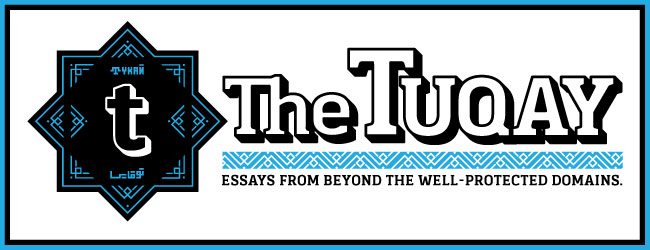
This piece was originally published on The Tuqay before it became part of Ajam Media Collective.
A printable version (.pdf) of this article is available here. An earlier version of this article had a misattributed quoted included. That quote has since been removed because of the error.
YÜKSEKOVA – As my host pours me tea, he asks me, “do you see how white this sugar is?”It’s Iranian, much more pure, so much better quality than Turkish sugar.” Later he will tell me the grains of Iranian rice are longer, and when his mother is cooking and those wonderful smells fill the house, he beams, ”Do you smell that? Iranian rice. It has much more aroma than Turkish rice.”
Smuggled goods are everywhere in Yüksekova, a town of some 60,000 people in Turkey’s southeast fifty kilometers from the Iranian border. Sugar and rice of course, but also dates, sweets, clothes, carpets, tea, coffee, cigarettes, and even fruits and vegetables. That’s not even mentioning petrol. Only meat never really made it to the illegal market; even for the daredevil smugglers and their consumers, the risk of unknowingly eating pork is just too great.
Smuggled goods are not sold secretly, but out in the open. Nobody makes any effort to limit the illegal trade. Not the police, not the customs authorities, not any other symbol of the government. Official businessmen have no problem with the trade, according to Sabıh Kayhan, the president of the Yüksekova Chamber of Commerce.
“Illegal trade and official business are separate worlds.” he says. “The main business of our members is steel, construction materials, furniture, stuff like that. Smuggling is about other products.”
Kayhan is in the furniture business himself, which is not doing all too well. Iran has raised tariffs on furniture.
The bigger problems, of course, are the US-led sanctions against Iran. Even though these sanctions are aimed at Iran’s oil exports and target foreign institutions that deal with Iran’s central bank, they affect all other trade as well. When the sanctions were first implied in January, they had a devastating effect on Iran’s currency, the rial. Turkish goods are now about twice as expensive for Iranians as they were in 2011. Consequently, exports from Turkey to Iran dropped dramatically.
Violence
”Smuggling,” says Kayhan, “makes it possible for people in this region to make a living.” Yüksekova is located at the heart of the predominantly Kurdish area in Turkey’s southeast. The region is heavily affected by ongoing violence between the Turkish army and the violent Kurdish PKK. Foreign and Turkish investment is rare in the region, and there are hardly any factories that provide jobs. Traditional farming has been in trouble since the 1990s, when the army declared an increasing number of fields restricted area – separating the locals from their land and hoping to funnel them into (largely nonexistent) urban employment. Smuggling is – for many locals – the only way to have any income at all.
All the same, smuggling is dangerous in an area where there is also military activity. That became very clear at the end of last December, when a group of 34 smugglers in the Uludere region, close to the Iraqi border, were bombed by the Turkish air force acting on drones’ intelligence. The army claims they thought the smugglers were PKK fighters, but that doesn’t make much sense. For decades, everybody – even in Ankara – knew the routes of the smugglers, they knew when the smugglers work and in many places, including Uludere, information is freely exchanged between the smugglers and the authorities both Turkish and Iraqi. Smugglers are, for example, warned when clashes between the Turkish military and the PKK are expected, so they can cancel their trip in time and stay safe.
Palaces
The full truth about the Uludere bombing will probably never come out. The bombing does make clear that smuggling, however accepted along Turkey’s borders to the south and east, is risky business. The Iranian border is probably the safest of these three; there are no mines like there are alongside the Syrian border and there are no PKK camps in the borderlands that are bombed by the army, like on the Iraqi border. Perhaps that explains the difference between the villages in Uludere district and those close to the Iranian border in the Yüksekova district. The villages close to Iran seem not so poor. The smuggling has a larger scale here, it seems. Some of the houses, where illegal petrol can be bought, deserve to be called palaces more than houses.
The price differences between smuggled goods and official goods can be tremendous. A liter of smuggled petrol is about 25% cheaper than Turkish petrol, sugar about 20%, and a kilo of honey is some 60% cheaper when illegally imported from Iran. The manager of a supermarket in central Yüksekova explains why people still buy Turkish and regional goods. “Look at this honey,” he says, pointing at beautiful liquid gold, with the comb nestled inside. ”It’s more expensive, but this is a locally produced honey of much better quality than the smuggled honey from Iran.”
“And the sugar?” I ask. “Who is buying that for 20% more than across the street in the illegal shop?”
The manager eyes the grains on his shelves and smiles. “Look, this is Turkish sugar. Do you see how white it is? Iranian sugar is not so pure.”
Fréderike Geerdink is a freelance Turkey correspondent, focusing on politics, human rights and women’s lives. She tweets at @fgeerdink (which you probably already knew), and can be found at Journalist in Turkey and Kurdish Matters.













